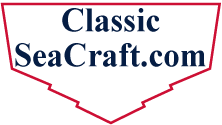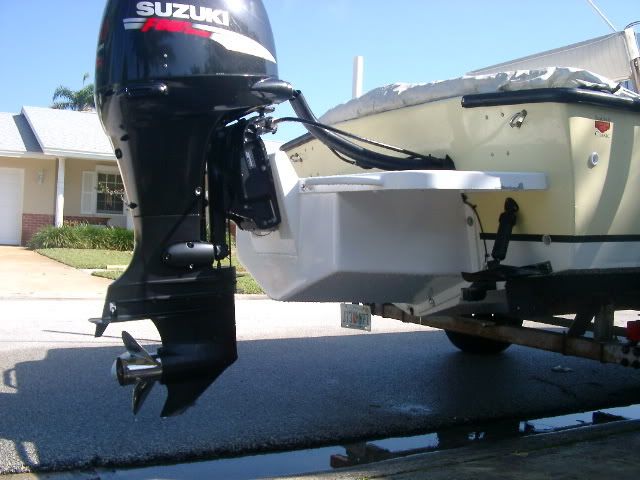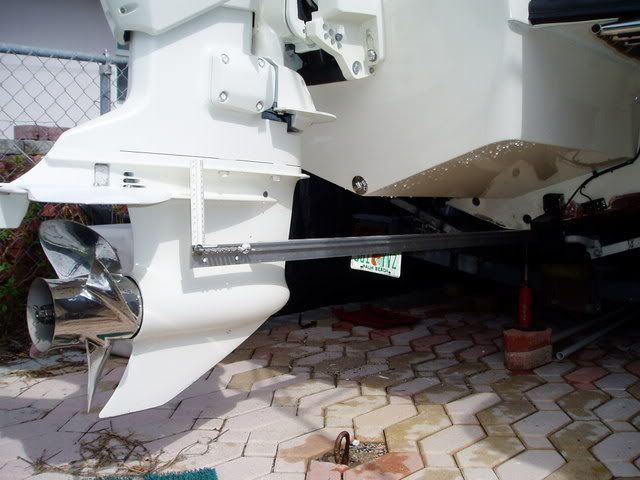
 |
|
#1
|
|||
|
|||
|
Now that I've got the old (1969) boat back on the hard, I'm debating what to do with her. Truth is, coming from inboard boats with full transoms, I never really felt safe with the low transom on the Seacraft. That and the lack of buoyancy aft to handle a 450 lb motor make me think an enclosed transom is the way to go. I'm a welder by trade so it wouldn't be too much trouble to make a nice aluminum bracket a la Hermco or Armstrong with a BIG flotation tank. My question is: what do you guys think of a bracket with a 20" motor? I've looked at all of the pictures of 20 footers with brackets and it looks like there's plenty of room to move the bracket platform down a couple inches and the motor as well. I know it's nice to have the motor out of the water in rough seas, but that wasn't ever an issue when it hung from the 20" transom. I looked at the yamaha manual and saw that I would only need about 24" from the mounting surface to the transom to be able to tilt the motor all the way up, which would lessen the effect of all that weight hung off of the back. I'd love to hear some opinions on this from people who run brackets on 20's or maybe Mr. Hermco himself.
|
|
#2
|
|||
|
|||
|
Bits, sorry to hear and learn from your loss. I have a 1979 20 MA that I want to do the same, to avoid the same, but have no solutions. Sorry again. I want to enclose my transom next fall, run a single 20" outboard 2 stroke, and possibly raise the floor while doing so. Best of my knowledge so far, she's being transported to Hermco, or Wildfire, of which I have no affiliation...just a long drive...Part II.
|
|
#3
|
|||
|
|||
|
One thing to consider is the motor height is usually raised one inch per foot of set back. Bay Manufacturing makes 5 inch shaft extension kits for many motors and might be a good route to go with your waterproof Yammie if thats what you'll be mounting on the bracket. They run 500-600 clams and some guys have found them much cheaper on ebay and such. I think if you're going custom to stick with your 20" shaft, you simply chop the flotation chamber rather than moving the bracket down. The latter effectively increases drag. Keep in mind that as you move the motor aft you cg will also move aft and your motor will sit even lower in the water, at least while at rest.
__________________
there's no such thing as normal anymore... |
|
#4
|
|||
|
|||
|
Quote:

|
|
#5
|
|||
|
|||
|
Since raising the transom from 20" to 25", keeping water out of the boat has no longer been a concern. -just my $.02
__________________
1969 Seacraft SF20 / 2003 Yam 130 "And the sea shall grant each man new hope. . ." - |
|
#6
|
|||
|
|||
|
Didn't mean to offend...just trying to get your attention. I figure you're the man for info on brackets. So I have a 20" Yamaha 150 that's tried and true and waterproof to boot. Am I wasting my time considering a 24" set back 20" high bracket to accommodate that motor? I could sell the motor, but who wants a previously sunken motor? At 450 lbs is it just too heavy for a bracket? I would obviously build the bracket with as much flotation as possible. Please let me know what your thoughts are on this.
|
|
#7
|
|||
|
|||
|
Your idea to build your own 24" set back bracket for a 20" shaft motor will probably work fine as long as you get the displacement from the bracket body as large as possible. I would also try to keep it as lightweight as possible.

|
|
#8
|
|||
|
|||
|
Bits,
Sorry to hear about your mishap  But a Big Congrats on the recovery But a Big Congrats on the recovery  If you have the means to custom build you own bracket, I believe you can use your 20" motor. Look at my setup with 25" motor. That is an aluminum B-Bracket(26" set back) that I later added the larger floatation chamber. The motor is mounted on the last hole as high as possible, and still could go alittle higher. The waterline is 1" below the black boot stripe. Notice how high the swimplatform is out of the water, with a shorter shaft motor, that can be lowered 2-3"  What ever you do with a bracket, just remember three things...FLOATATION,FLOATATION,FLOATATION!  Lloyd
__________________
1973 Seacraft 20' SF "Sea Dog" 1988 Tracker/Seacraft 23' WA "Salty Dog" |
|
#9
|
|||
|
|||
|
Hi, thanks everybody for your support during the the sinking/salvage. It really helped to get some positive input and strategies from people who have experience raising boats. I posted on another forum looking for ideas and places to rent equipment and didn't get the kind of feedback you guys provide. These types of forums are invaluable.
As far as the bracket, that's exactly what I was looking for Lloyd: waterline, height of bracket and position of the motor on the bracket. I'm starting to think a 20" motor will actually end up looking a bit slicker on the bracket than the 25". If you raise the motor one inch per foot of setback and you start with it 1 1/2" up from the keel, I assume my cavitation plate should be around 3 1/2" above the keel? How much distance should I put between the keel and the bottom of the flotation chamber? Should the chamber then taper up or continue parallel to the keel? |
|
#10
|
|||
|
|||
|
Quote:
3.5" cav plate height above keel is just about right on my rig - it's one of Don's brackets with 30" setback. (See following pics.) I raised motor 2 holes from where Don mounted initially and picked up some performance, but don't think I can go much higher without prop ventilation and handling issues.   Bottom of flotation tank should come straight back to get max flotation. Hermco is the only bracket I've seen like that; I think Armstrong and the others are losing a lot of flotation with the sloped bottom! Bottom of my bracket is about 4" above keel. I did some measurements and calcs last weekend and it looks like my flotation tank sits about about 10.75" deep in water, which works out to about 283 lbs of positive flotation. (Note: if entire tank in submerged, total positive flotation is about 485 lbs) Waterline at the transom looks to be 4-4.5" above chine.  Putting tank bottom closer to keel would provide even more flotation, but I don't know if there are any downsides to getting it too close to bottom. I believe one advantage of bracket is that it puts motor further behind boat in "cleaner" water, so that implies you need some sort of vertical step in the running surface to get it out of the water. Minimum step height would depend on running angle; when you're first coming up on plane, that long straight bottom on tank should act like a big trim tab while it's still in the water. One other consideration with a bracket is that once you're up on plane the flotation tank isn't doing anything, but the rearward shift of the motor has shifted CG of the boat aft. (Do a search for my previous post on pro's & con's of brackets, done a few weeks ago.) This will tend to raise the bow and help top speed, but it'll hurt ride in rough water and will tend to increase your min planning speed. I found that I needed a stern lifting prop and doelfin to get my min planning speed down to ~12 mph where it was with my old 300 lb motor hanging on the transom. CC's are more stern-heavy than the Seafari, so this effect might be more pronounced on your boat. I'm running a 429 lb motor with 30" setback and boat is just barely self-bailing with no one aboard. 450 lb motor with 24" setback is probably similar, except that I have more weight forward. If I had it to do over again, I'd go with a 24" setback and possibly a lighter motor, maybe a 115. That "150" (165) will push the boat to almost 50 mph, waay more speed than I really need! (But it IS fun!) Denny
__________________
'72 SeaFari/150E-Tec/Hermco Bracket, owned since 1975. http://i188.photobucket.com/albums/z...Part2019-1.jpg |
 |
|
|